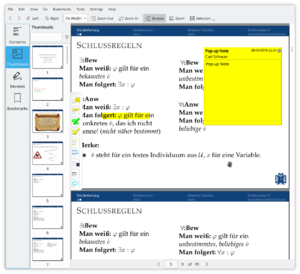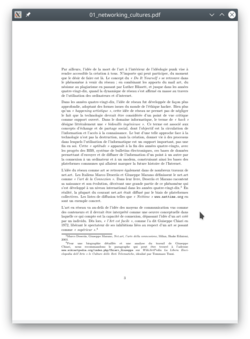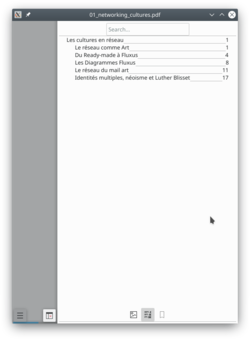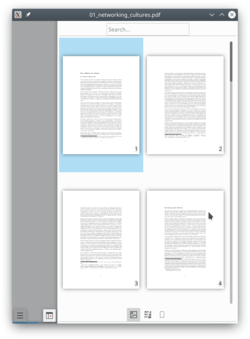Okular: Difference between revisions
Marked this version for translation |
add section about okular mobile and more information section |
||
| Line 31: | Line 31: | ||
<!--T:11--> | <!--T:11--> | ||
If you are interested in contributing to '''Okular''', please [http://okular.kde.org/contact.php contact the team]. Programmers and non-coders are welcome all the same. | If you are interested in contributing to '''Okular''', please [http://okular.kde.org/contact.php contact the team]. Programmers and non-coders are welcome all the same. | ||
== Mobile Version == | |||
Okular has a mobile version since version 0.16 release in February 2013 <ref>[https://okular.kde.org/news.php]</ref>. The first version was based on the [https://community.kde.org/Plasma/Active active] framework. The mobile viewer was then ported to Kirigami in 2016 by Marco Martin<ref>[https://phabricator.kde.org/R223:eb1f73800e83b11e4a5ae93ac069893aa88f0eaa]</ref> and finally to Kirigami2 in 2017<ref>[https://phabricator.kde.org/R223:caf8820cf773316ce41d9a8c1f7357b3ffc3ef86]</ref>. | |||
The mobile version doesn't support all features form desktop version, but provide better touch support and a mobile interface. | |||
[[File:Okular_mobile_pdf_view.png|250px]] | |||
[[File:Okular_mobile_toc.png|250px]] | |||
[[File:Okular_mobile_thumbmails.png|250px]] | |||
You can test the mobile version in your PC by entering {{Input|1=okularkirigami}} in your [[Special:myLanguage/Tutorials/Open a console|terminal]]. | |||
==Hints and Tips== <!--T:12--> | ==Hints and Tips== <!--T:12--> | ||
| Line 45: | Line 57: | ||
By default, '''Okular''' saves annotations in the local data directory for each user. Since KDE 4.9, it's optionally possible to store them directly in a PDF file by choosing <menuchoice>File -> Save As...</menuchoice>, so they can be seen in other PDF viewers. | By default, '''Okular''' saves annotations in the local data directory for each user. Since KDE 4.9, it's optionally possible to store them directly in a PDF file by choosing <menuchoice>File -> Save As...</menuchoice>, so they can be seen in other PDF viewers. | ||
Note that this feature requires Poppler 0.20 or newer for regular PDF documents. If the PDF document you are annotating is encrypted, this feature requires Poppler 0.22 or newer. | Note that this feature requires Poppler 0.20 or newer for regular PDF documents. If the PDF document you are annotating is encrypted, this feature requires Poppler 0.22 or newer. | ||
== More Information == | |||
* [https://docs.kde.org/trunk5/en/kdegraphics/okular/index.html Official KDE documentation] | |||
* [https://okular.kde.org/ Okular website] | |||
* [https://api.kde.org/okular/html/index.html Okular API documentation] | |||
* [https://phabricator.kde.org/project/view/158/ Okular phabricator project] | |||
* [https://phabricator.kde.org/source/okular/ Okular git repository] | |||
<!--T:14--> | <!--T:14--> | ||
[[Category:Graphics]] | [[Category:Graphics]] | ||
</translate> | </translate> | ||
Revision as of 17:36, 3 February 2019
What is Okular?
Okular is a universal document viewer developed by KDE. Okular works on multiple platforms, including but not limited to Linux, Windows, Mac OS X, *BSD, etc.
You can watch for development at the project Home Page.
Background
Its development began as part of Google's Summer of Code program. The description of the project can be found at KDE Developer's Corner.
Okular combines the excellent functionalities of KPDF with the versatility of supporting different kinds of documents, like PDF, Postscript, DjVu, CHM, and others.
The document format handlers page has a chart describing in more detail the supported formats and the features supported in each of them.

As well as supporting many formats, Okular offers such features as text selection, annotation, extraction of files embedded within a document, and many other surprises. Screenshots of Okular in action can be seen here.
You can talk to developers and other users on IRC, irc.freenode.org, channel #okular.
If you are interested in contributing to Okular, please contact the team. Programmers and non-coders are welcome all the same.
Mobile Version
Okular has a mobile version since version 0.16 release in February 2013 [1]. The first version was based on the active framework. The mobile viewer was then ported to Kirigami in 2016 by Marco Martin[2] and finally to Kirigami2 in 2017[3].
The mobile version doesn't support all features form desktop version, but provide better touch support and a mobile interface.
You can test the mobile version in your PC by entering
okularkirigami
in your terminal.
Hints and Tips
Reviewing Documents / Annotations
Double clicking on either one of the Review tools (F6) allows you to make multiple annotations without having to reactivate the tool after the first time.
How to keep the annotations you made to the PDF file:
By default, Okular saves annotations in the local data directory for each user. Since KDE 4.9, it's optionally possible to store them directly in a PDF file by choosing , so they can be seen in other PDF viewers. Note that this feature requires Poppler 0.20 or newer for regular PDF documents. If the PDF document you are annotating is encrypted, this feature requires Poppler 0.22 or newer.



